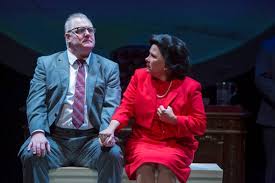Review of “All the Way”: Cincinnati Shakespeare Company
All the Way, a raw and unflinching portrayal of the tumultuous year between the Kennedy assassination and Lyndon Johnson“™s presidential run in 1964, explodes onto the Cincinnati Shakespeare Company“™s stage. The 2014 Tony winner written by Robert Schenkkan is crafted as a thriller which shows three different camps striving to either promote or destroy the civil rights movement in the 1960“™s. As the audience, we can eavesdrop on the political strategies and shenanigans developed by “œaccidental president“ LBJ (Jim Hopkins), the black caucus of Rev. Martin Luther King (Sylvester Little, Jr.), Roy Wilkins (“œranney“) and Rev. Abernathy (Warren Jackson) plus the Southern Democratic bloc opposition led by Senator Russell (Joneal Joplin). Additionally, we see the fractures within each of the groups as the NAACP (Wilkins and King) fights the more aggressive groups (Abernathy) while pragmatic Johnson spars with the more liberal and idealistic Senator Hubert Humphrey (Brent Vimtrup).

At the center of the show is the spot-on portrayal of Johnson by Jim Hopkins. This is an ensemble piece, not a “œstar“ vehicle, but the show is driven by the bombastic and irascible master politician Johnson. Fortunately, Hopkins does not try to impersonate LBJ but rather mimics his facial expressions and channels his unique Texas drawl but, more importantly, fills the theater with his enormous personality and ego. However, we also see Johnson and the other historical personages as real people complete with blemishes, warts, prejudices and selfish motivations. J. Edgar Hoover (Bruce Cromer) is shown as venal and petty while traversing his own agenda to castigate and humiliate King, against Johnson“™s wishes, while King“™s extramarital affairs are publicized. None of this, however, is gratuitous since it demonstrates human foibles.
At its heart, this is a study of the rough and tumble of American politics. Johnson was the master manipulator and compromiser, trading votes for congressmen“™s pet projects, sweet talking, arm twisting, intimidating and threatening when necessary. Johnson chastises Humphrey by saying that politics “œain“™t about principles. It“™s about votes.“ We can also see the entrenched Southern opposition to any form of desegregation. They warn LBJ that his stance on civil rights will lose the entire South to the Republicans. How prescient.
Another interesting ploy is the juxtaposition of several stereotypical black occupations of tailor, servant, bartender and barber versus their political and powerful counterparts. The “œservants“ never talk while the leader“™s pontificate.
This is a very large cast with many of the actors playing multiple roles. In addition to those mentioned above, some other outstanding performances include Kate Wilford as Lady Bird (among others), Justin McCombs with a supercilious take on George Wallace, Candice Handy as Coretta King plus an impassioned speech by Fannie Lou Hamer, Maggie Lou Rader as the ambitious wife of Humphrey and the fawning spouse of George Wallace.
The static set design by Shannon Moore is elegant and efficient. There are two stairways leading to what appears to be jury boxes or choir lofts on each side of the stage. There were actual audience members in some of the seats and other actors would frequent the space as well, often acting as a “œGreek Chorus“ or as a crowd. A number of props were rolled in including the Presidential desk, signage carried by the Black caucus and several structures which subbed for tables, chairs, etc. Scene changes were differentiated by lighting (Justen Locke) and sound (Douglas Borntrager). In reality, the entire theater was the stage since a lot of the action took place in front of the stage and in the aisles. Costumes and wigs by Rainy Edwards faithfully depict the Washington dress of the era.
The frenetic pace is a combination of the lighting, video, sound and constant motion by the actors all effectively choreographed by Director Brian Isaac Phillips.
All of the dramatic elements combine to make this one of the most powerful shows and performances I have seen in a while. The show is lengthy and it helps if you know a little of the actual history that is shown. In an actual election year, the timing is appropriate and many of the themes, disagreements and biases are still with us. Consequently, I encourage you to “œelect“ to see the nomination of “All the Way”, currently running as the Cincinnati Shakespeare theater.


